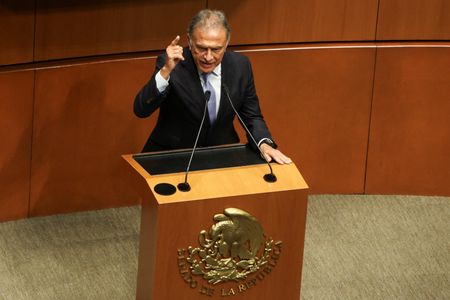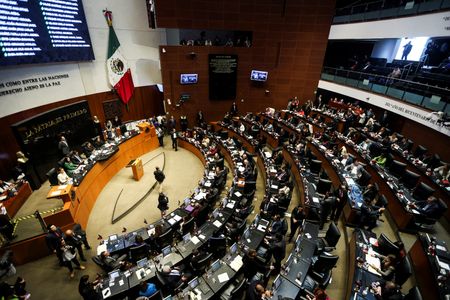MEXICO CITY (Reuters) -Mexican senators opened debate on Tuesday ahead of a vote on a controversial judicial reform, after a tense discussion in which opposition lawmakers unsuccessfully tried to stall debate and accused the ruling bloc of underhand tactics to secure votes.
The vote is expected to be tight, with the ruling coalition formally one senator short of the two-thirds majority needed to pass the constitutional reform, which will overhaul the country’s judiciary by popularly electing judges and cutting the amount of experience needed to hold posts.
Senators are expected to vote on the reform later, with debate likely to go into the early hours of Wednesday.
Protesters blocked roads and waved Mexican flags outside the Senate building in opposition to the reform, which has prompted widespread demonstrations in recent weeks.
Opposition senators said Daniel Barreda, senator of the opposition Citizens Movement party from Campeche, had been detained and accused the ruling bloc of being involved so that he would not be able to vote.
“What is happening today… These pressures, which are real and you know it, are absolutely unacceptable,” said opposition Senator Ricardo Anaya Cortes.
Adan Augusto Lopez, leader of the ruling Morena party in the Senate, said the information about the arrest was false and that he had spoken directly with Barreda.
Speculation is also mounting that opposition PAN senator Miguel Angel Yunes has switched allegiance to the ruling bloc over the reform. While the Senate was in session, Yunes requested medical leave in a letter read by the secretary of the Senate’s board of directors. His father acted as his substitute with PAN lawmakers booing him as he spoke.
The backbone of the constitutional reform, proposed by outgoing President Andres Manuel Lopez Obrador, calls for the election by popular vote of more than 6,500 judges and magistrates, including the Supreme Court.
Lopez Obrador and President-elect Claudia Sheinbaum have vigorously defended the reform as essential for holding judges accountable and reducing corruption.
The reform also proposes reducing the number of Supreme Court justices to nine from 11, shortening their terms to 12 years and cutting required work experience from 10 to five years.
Mexico’s major trading partners, the United States and Canada, have warned the changes could undermine the USMCA trade pact and negatively impact investment.
(Reporting by Cassandra Garrison; additional reporting by Diego Ore; editing by Stephen Eisenhammer and Alistair Bell)












